| New Delhi |
Updated: December 3, 2020 7:48:24 pm
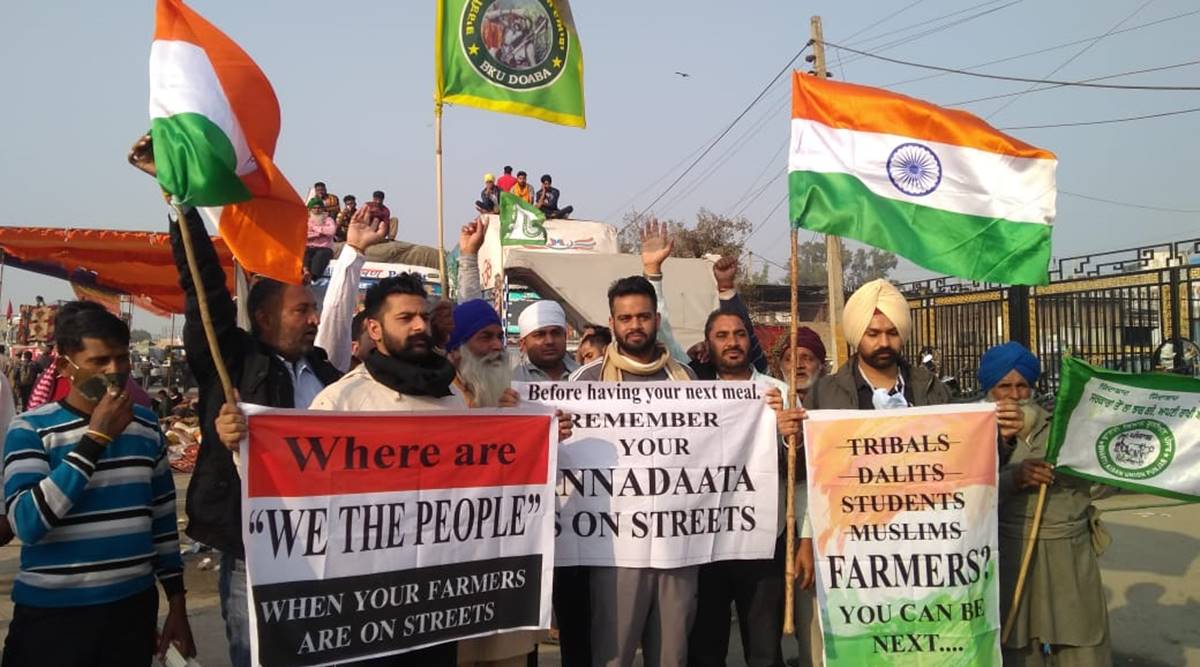
Protesters with placards at the Singhu border on December 2. (Express photo: Yashee)
The first thing that strikes you at New Delhi’s Singhu border, where protesting farmers have gathered, is the sheer number of people. Close to 300 are sitting at one place alone, listening to a speech, their colourful turbans and flowing beards ensuring they don’t melt into a mass but stand out as hundreds of individuals. Follow farmers protest LIVE updates
There are rows upon rows of langars being served. Tall, elderly men walk around, serving rotis and daal. There are flags around, of farm unions, Left labour unions, and the Tricolour. Ever so often, there are slogans of “Inquilaab zindaabad, kisaan ekta zindabad, kisaan majdoor chhatra ekta zindabaad.”
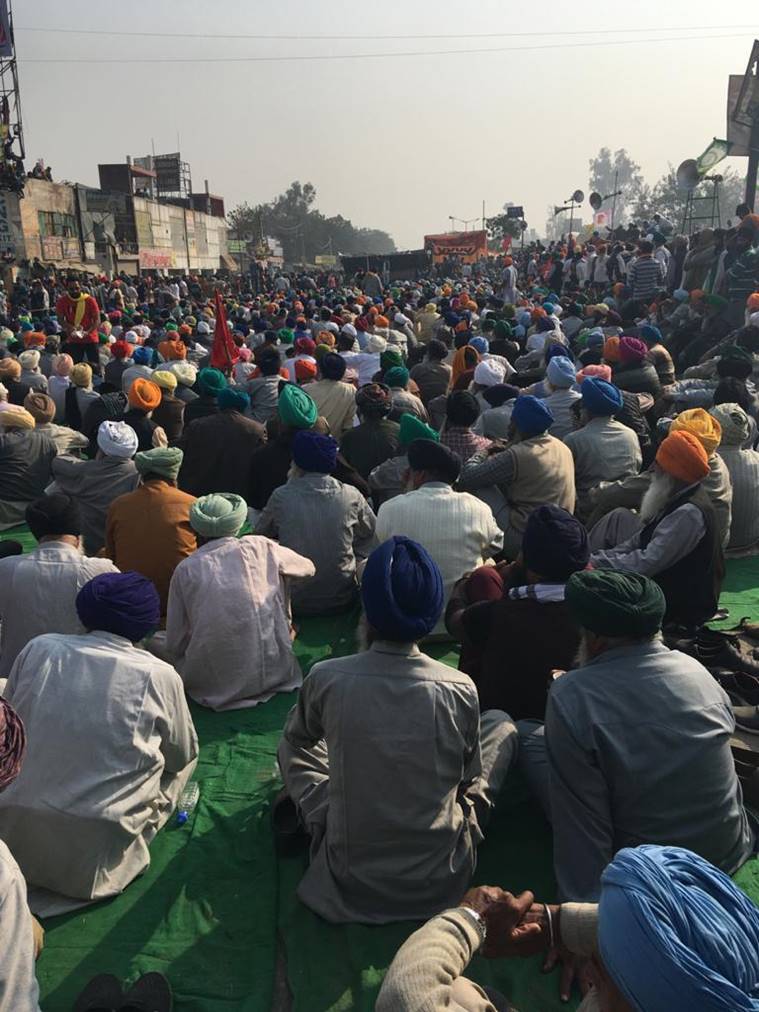 This is the crowd at just one section of the protest site. (Express photo: Yashee)
This is the crowd at just one section of the protest site. (Express photo: Yashee)
Scores of tractors are parked, serving as temporary homes, in which people doze, chat, sip tea. In a corner are heaps of potatoes, cauliflowers, tomatoes. There’s even a horse, standing proudly aside from the throng of humanity.
“Does this look like a group that will go home in a few days?” asks Baljeet Singh, a farmer from Khanna in Punjab. “We are here for the long haul. We will stay here for as long as it takes for this government to realise that it can’t ignore voices it doesn’t like.”
The protest against farm laws at Singhu border, and other Delhi borders, comes months after a similar indefinite protest inside the national capital –– the Shaheen Bagh stir against CAA-NRC, which made headlines worldwide and was finally broken up after nearly three months because of Covid-19. There are similarities –– and the very crucial differences –– about the atmosphere at the two protest sites.
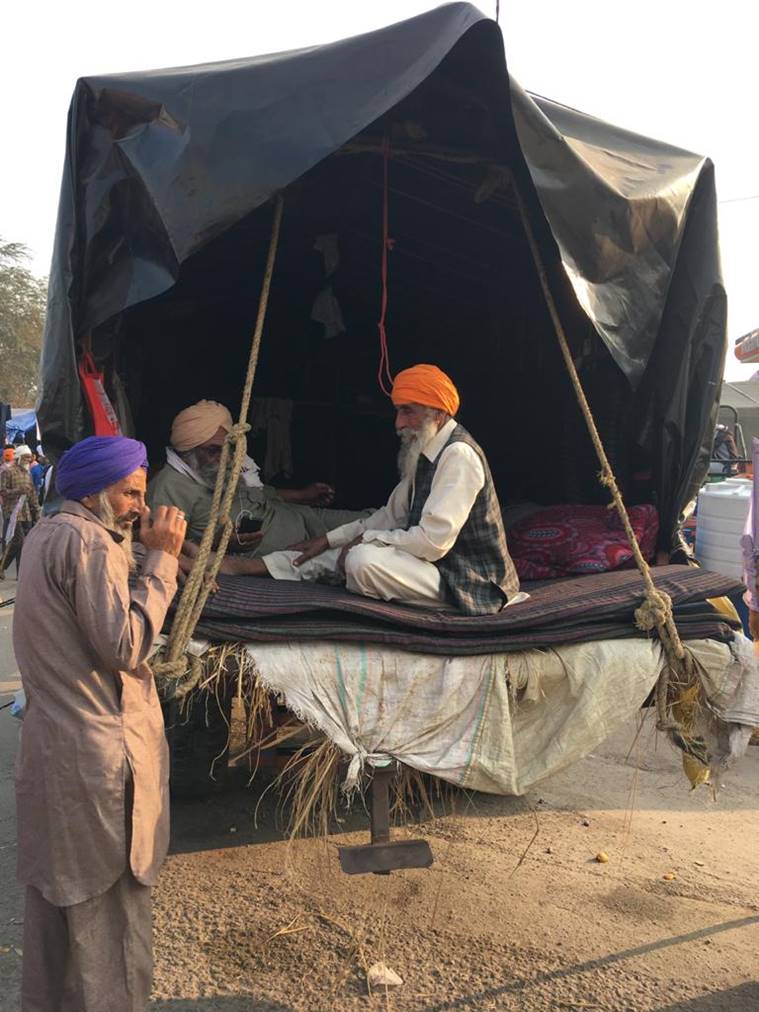 Tractors are serving as temporary homes for the protesters. (Express photo: Yashee)
Tractors are serving as temporary homes for the protesters. (Express photo: Yashee)
Like at Shaheen Bagh, at Singhu, people are emphatic they love the country, respect the Constitution, and are protesting only because they feel their constitutional rights are being infringed upon. But if Shaheen Bagh had the grim determination of a last stand, farmers at Singhu are more upbeat.
Kuljit Singh Bhinder, who owns farmland at Moga in Punjab, encapsulates it when he says, “The central government thinks it can steamroll ahead with any move it wants. This time, it has come up against farmers. We will not break any law, we will remain non-violent, but we will show them we are no pushovers.”
Also common with Shaheen Bagh is the anger that the government seems to think people are “misled” and “don’t understand” the laws.
Gurjot Singh, a college teacher from Khanna whose family are farmers, says, “The BJP really needs to stop assuming we are all so gullible as to be misled by its political opponents. They are saying farmers don’t understand how the laws will impact them. In Punjab, nothing except these laws has been discussed for the past two months. This protest at New Delhi didn’t spring up overnight. People have had time to read up and understand the laws, and also study the government’s reaction. It is the central government that didn’t understand how upset the farmers were when we were protesting only in Punjab.”
Also Read | Talks with Centre: Wheat sowing over, farmers have free time to continue agitation
Suroop Singh, a farmer from Patiala, agrees. “Farmer union activists have been going from village to village for months now, explaining these laws to the people. We are not fools. We wouldn’t leave behind our homes and families if we were not convinced.” Jai Singh, another farmer from Jind in Haryana, adds: “They are now talking about explaining these laws to us, when we’ve turned up in thousands at the capital’s borders. Haryana has a BJP government. Why didn’t BJP leaders and MLAs enlighten us earlier?”
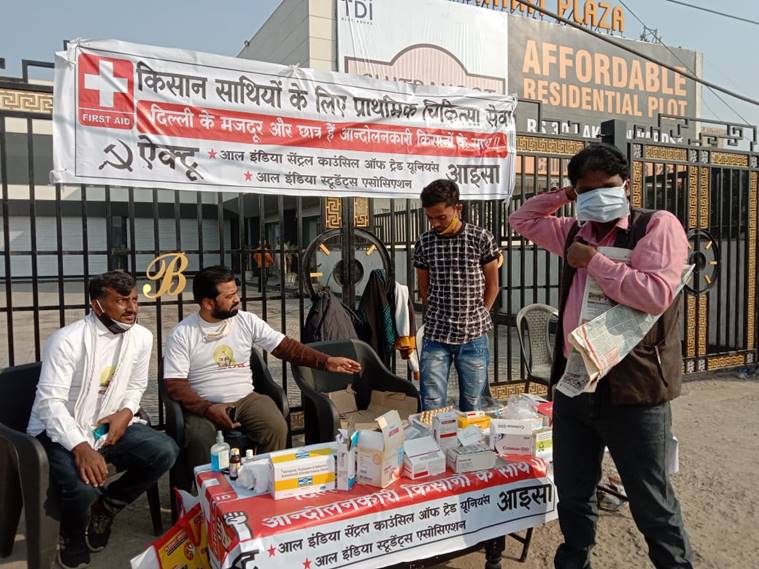 A medicine camp being run by volunteers. While the farmers did not complain, the volunteers said many have developed cough and cold, joint pains. (Express photo: Yashee)
A medicine camp being run by volunteers. While the farmers did not complain, the volunteers said many have developed cough and cold, joint pains. (Express photo: Yashee)
Another common feature to Shaheen Bhag and Singhu is a feeling that what the government says can’t be trusted, because its actions speak differently.
At Shaheen Bagh, protesters would agree that the text of the law was about giving citizenship to minorities, but their fears stemmed from otherising statements made by all top BJP leaders. At Singhu, Uday Pratap Singh, an advocate at Punjab and Haryana High Court, says: “If the laws really are as beneficial for farmers as the Centre claims, why were they rushed through Parliament in such a sneaky manner? Why bring up an ordinance first, and then pass it in Rajya Sabha through voice vote? How can we trust the government’s very late reassurances about the farm laws when it openly favours big corporates?”
Daljeet Singh, a farmer from Moga, says: “The whole country saw how the central government tried to paralyse Punjab by blocking trains. They now want us to trust them? The President is not giving assent to Punjab’s farm laws. The BJP’s own ally, the SAD, couldn’t get them to listen. How can we the common people trust them?”
They are aware of the negative things being said about them. Union minister VK Singh has said not all those protesting “appear to be farmers”. Social media was abuzz for days over a “farmer speaking English”.
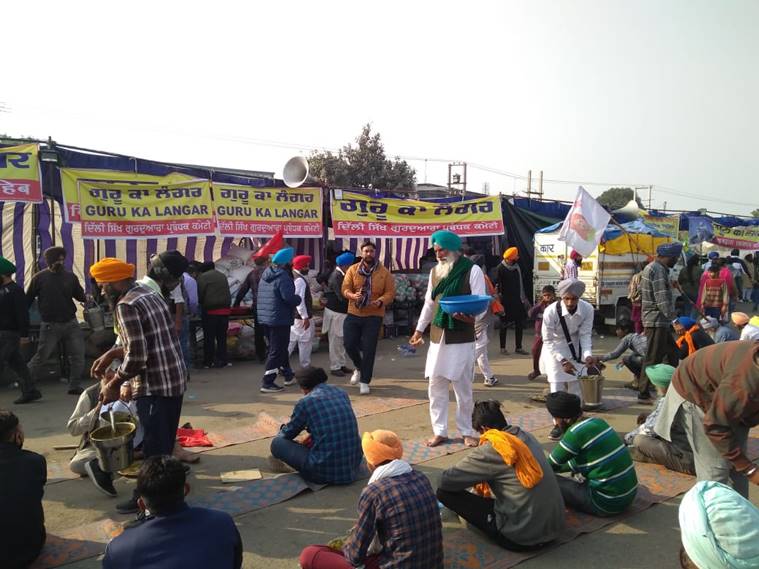 At the langars, people not involved with the protest are also welcome to join. Away from the langar, people walk around, distributing jaggery and bananas to all. (Express photo: Yashee)
At the langars, people not involved with the protest are also welcome to join. Away from the langar, people walk around, distributing jaggery and bananas to all. (Express photo: Yashee)
“The right wing ecosystem seems to think people are stick figures, caricatures,” says Simranjeet Singh, a farmer from Fatehgarh Sahib. “What exactly is a farmer supposed to look like? No one, Muslims, farmers, farm labourers, is the narrowest, one-dimensional definition of their identity. Maybe social media warriors need to come out and meet some protesters, so they understand the many things an individual can be, all at once.”
And this is where the main difference from Shaheen Bagh comes in. At Singhu, farmers can afford to be more flippant about the criticism being thrown at them than Shaheen Bagh. And they are aware of it. Simranjeet continues, “I have friends in Jamia. They were at Shaheen Bhagh. Shaheen Bhagh had this pressure of being a civics and moral science lesson all at once. The right wing will have to work harder at villainising us. We are aware of the privilege that is. We have people with kirpaans, armed Nihangs walking about. No armed person could have roamed about Shaheen Bagh…”
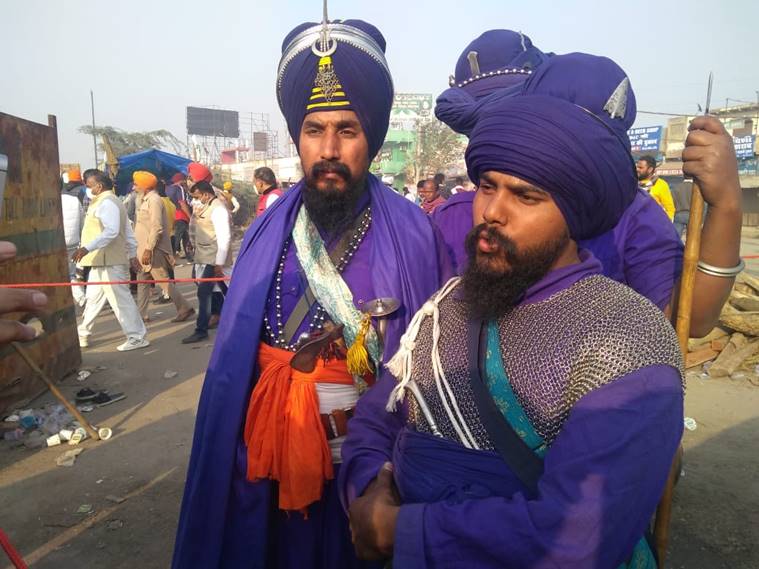 Nihangs from Jathedar Baba Maan Singh 96 crori Baba Budha Dal at the protest site. (Express photo: Yashee)
Nihangs from Jathedar Baba Maan Singh 96 crori Baba Budha Dal at the protest site. (Express photo: Yashee)
Thus, the atmosphere here is more relaxed, less pushed-to-the-wall. “People listen to Punjabi songs in the evening. They play cards. If Shaheen Bagh did the same, they would be labeled as picnickers troubling commuters because they like to create trouble,” says Gurpreet Kaur, a Delhi University student who did not travel here with farmers, but visits to express solidarity. “I visited Shaheen Bagh too. Here the Centre is already talking to the farmers. At Shaheen Bagh, all the government did was tar them noon to night. People there had the heartbreak of a land they loved suddenly trying to otherise them, which the farmers don’t have,” she says. “Yet,” she adds.
Simranjeet says: “While identity at Singhu is not the tricky minefield it was at Shaheen Bagh, I think both the protest sites have the same message –– we the people have a brain and a voice, and a democratic government should respect both.”
© IE Online Media Services Pvt Ltd
This article is auto-generated by Algorithm Source: indianexpress.com



